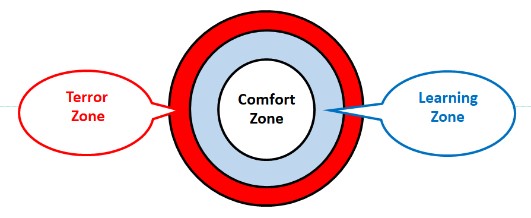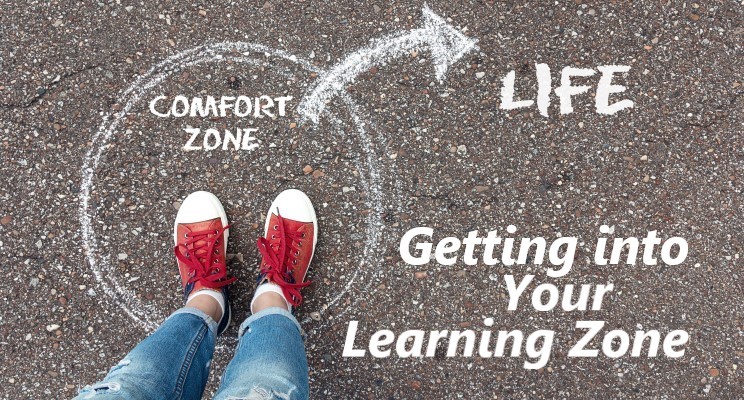As humans, most of us tend to be creatures of habit and routine; e.g., we drive the same way to work every day; we sit in the same spot in staff meetings; the first thing we do at work in the morning is to check email; or, we spend our “free time” doing the same things we’ve always done. While it may be comfortable doing the same thing, in the same way, that approach tends to limit our life experiences and how much we learn, grow and live life to the fullest.
Click here to read “How Much Experience Do You Really Have?”
 If you reflect on your life, and your significant learning events, I predict most of them happened on the outside of your comfort zone, e.g., the first time you successfully rode a bicycle, began a new job, mastered a new skill, learned to ski, or the first time you gave a speech in front of a large group of people. I submit our most powerful, and sometimes most important, learning experiences happen beyond our comfort zones, in what I call our “learning zones.”
If you reflect on your life, and your significant learning events, I predict most of them happened on the outside of your comfort zone, e.g., the first time you successfully rode a bicycle, began a new job, mastered a new skill, learned to ski, or the first time you gave a speech in front of a large group of people. I submit our most powerful, and sometimes most important, learning experiences happen beyond our comfort zones, in what I call our “learning zones.”
When working with adult learners in workshops, my experience suggests participants must be engaged beyond lecture and beyond PowerPoint presentations. (I have both delivered, and endured, my own share of “death by PowerPoint” presentations. 😊)
As a facilitator of adult learning workshops, my experience suggests the use of “learning activities and simulations” tend to nudge participants out of their comfort zones and into their learning zones.

The problem for facilitators like myself is this; every participant has a unique learning style, and most have comfort zones of varying sizes. For example, some participants raise their hand frequently to make contributions to class discussions, and some would never say a single word in an 8-hour class if left to their own discretion.
My experience also suggests that adults don’t learn well if forced beyond their learning zone into their “terror zone” either. (See illustration above.) We all know what that is like. (I still remember being called to the chalkboard in my high school algebra class to demonstrate an algebraic solution in front of my classmates. The only thing I learned that day was that I hated algebra.) So, the trick becomes getting people out of their “comfort zones” while at the same time, avoiding their “terror zones.” Isn’t this phenomenon true in all of life?
Where, or how, are your “comfort zones” limiting your learning, growth or ability to live life to the fullest? Perhaps as 2019 draws to a close, now is the time to consider stepping outside your comfort zones more in 2020. What that looks like is different for all of us. Here are some ideas:
- Bored in your current job? Volunteer for a special project or assignment? Ask for a lateral transfer or a job shadowing opportunity to learn new skills.
- Lonely or bored in your personal life? Sign up for a class. Join a club. Start a club. Teach a class.
- Looking for a larger circle of friends and/or social engagements? Start a book club or softball league at work, in your church or school. Take the risk of extending a dinner invitation to a neighbor or colleagues from another department.
- Is there a hobby or idea you have procrastinated or resisted because of a fear of failure? Now may be the time to step out of your comfort zone and give it a try. Click here to read, “Alligators Under My Bed”
Are you willing to share your ideas on this topic with other readers? What are your thoughts on this topic? In what ways do you stretch your comfort zones?
How will you live, or lead, differently or better this coming week?
Sincerely,
Bryan Yager
208.376.1701
“Expanding Your Capacity for Success”
Do you know someone who might benefit from this weekly leadership minute? If so, please feel free to pass along the subscription link below:
Click here to sign up for my weekly leadership message entitled Monday Morning Minute.

